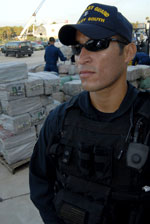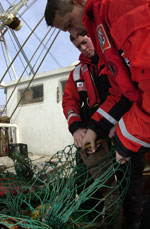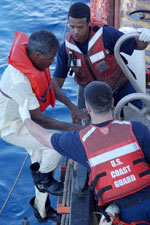
Missions
Maritime Security
- Ports, Waterways & Coastal Security (PWCS)
- Drug Interdiction
- Alien Migrant Interdiction
- EEZ & Living Marine Resource
- Maritime Law Enforcement Academy (MLEA)
- Law/Treaty Enforcement
 Since 1790, the Coast Guard has served as America's principal "law
of the sea" agency. Originally established by Alexander Hamilton as
the Revenue Marine, the Coast Guard began with the mission of enforcing
import tariffs. Since then its maritime-security responsibilities have expanded
exponentially, and almost always synergistically, to include the enforcement
of all federal laws at sea--from stopping terrorists and pirates to enforcing vessel-safety
regulations and fisheries conservation laws to interdicting drug and migrant
smugglers. Because the Coast Guard has law-enforcement authority, it can
apprehend foreign fishing vessels engaged in poaching, interdict vessels
carrying illegal drugs and undocumented migrants, and stop unsafe boaters.Today,
U.S. national-security interests can no longer be defined solely in terms
of direct military threats to America and its allies. Working under the
necessarily broader current definition of national security, the Coast Guard
is seeking to reduce the risk from terrorism to U.S. passengers at foreign
and domestic ports and in designated waterfront facilities, but it faces
the extremely difficult challenge of enforcing increasingly complex laws
against highly sophisticated adversaries. Coast Guard boarding teams deal
continuously with violations of multinational fisheries agreements and foil
high-tech attempts to smuggle drugs into the United States.
Since 1790, the Coast Guard has served as America's principal "law
of the sea" agency. Originally established by Alexander Hamilton as
the Revenue Marine, the Coast Guard began with the mission of enforcing
import tariffs. Since then its maritime-security responsibilities have expanded
exponentially, and almost always synergistically, to include the enforcement
of all federal laws at sea--from stopping terrorists and pirates to enforcing vessel-safety
regulations and fisheries conservation laws to interdicting drug and migrant
smugglers. Because the Coast Guard has law-enforcement authority, it can
apprehend foreign fishing vessels engaged in poaching, interdict vessels
carrying illegal drugs and undocumented migrants, and stop unsafe boaters.Today,
U.S. national-security interests can no longer be defined solely in terms
of direct military threats to America and its allies. Working under the
necessarily broader current definition of national security, the Coast Guard
is seeking to reduce the risk from terrorism to U.S. passengers at foreign
and domestic ports and in designated waterfront facilities, but it faces
the extremely difficult challenge of enforcing increasingly complex laws
against highly sophisticated adversaries. Coast Guard boarding teams deal
continuously with violations of multinational fisheries agreements and foil
high-tech attempts to smuggle drugs into the United States.
Immediately after the terrorist attacks on 9/11, the Coast Guard expanded its port security activities. The Ports, Waterways and Coastal Security (PWCS) mission entails the protection of the U.S. Maritime Domain and the U.S. Marine Transportation System and those who live, work or recreate near them; the prevention and disruption of terrorist attacks, sabotage, espionage, or subversive acts; and response to and recovery from those that do occur.
 The influx of illegal drugs is one of America's maritime-security problems.
As the nation's leading maritime agency in protecting the U.S. public from
the drug threat, the Coast Guard plays a key role in implementing the President's
national drug-control strategy. Despite the vast complications in enforcement,
the Coast Guard performs this new task with only modest additional funding.
A tremendous number of assets are required to patrol the long coastlines
of the United States and the even greater expanse of waters encompassing
the maritime "transit zones" used by drug smugglers. This six-million-square-mile
area, roughly the size of the continental United States itself, includes
the Caribbean, the Gulf of Mexico, and the Eastern Pacific.
The influx of illegal drugs is one of America's maritime-security problems.
As the nation's leading maritime agency in protecting the U.S. public from
the drug threat, the Coast Guard plays a key role in implementing the President's
national drug-control strategy. Despite the vast complications in enforcement,
the Coast Guard performs this new task with only modest additional funding.
A tremendous number of assets are required to patrol the long coastlines
of the United States and the even greater expanse of waters encompassing
the maritime "transit zones" used by drug smugglers. This six-million-square-mile
area, roughly the size of the continental United States itself, includes
the Caribbean, the Gulf of Mexico, and the Eastern Pacific.
The protection of U.S. living marine resources--primarily through the detection and deterrence of illegal fishing activity--is another of the Coast Guard's historic mission areas of responsibility that continues to expand. Beginning with the protection of the Bering Sea fur seal and sea otter herds and continuing through the vast expansion following World War II in the size and efficiency of global fishing fleets, Coast Guard responsibilities in this mission area now include enforcement of laws and treaties in the 3.36-million-square-mile U.S. Exclusive Economic Zone (EEZ), the largest in the world.

The flood of undocumented migrants in boats onto America’s shores is both a threat to human life and a violation of U.S. and international laws. Coast Guard migrant-interdiction operations are as much humanitarian efforts as they are law-enforcement missions. In fact, the majority of migrant interdiction cases handled by the Coast Guard actually begin as search-and-rescue missions, usually on the high seas rather than in U.S. coastal waters. The Coast Guard is the lead agency for the enforcement of U.S. immigration laws at sea, stressing sensitivity in dealing with undocumented migrants in all realms: mass migration, asylum/refugee requests, smuggling and repatriation. In its effort to increase U.S. security against undocumented migrations, the Coast Guard constantly monitors maritime transit zones, interdicting undocumented migrants, rescuing people from sinking or unsafe vessels, providing humanitarian assistance, and training nations to discourage undocumented migration into the United States.

